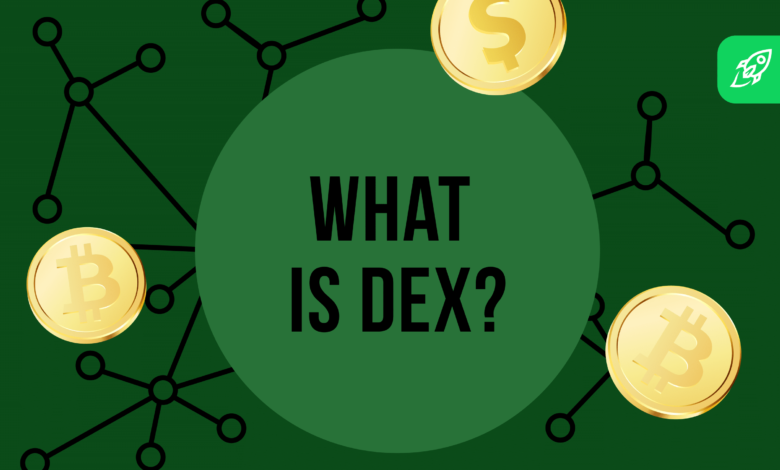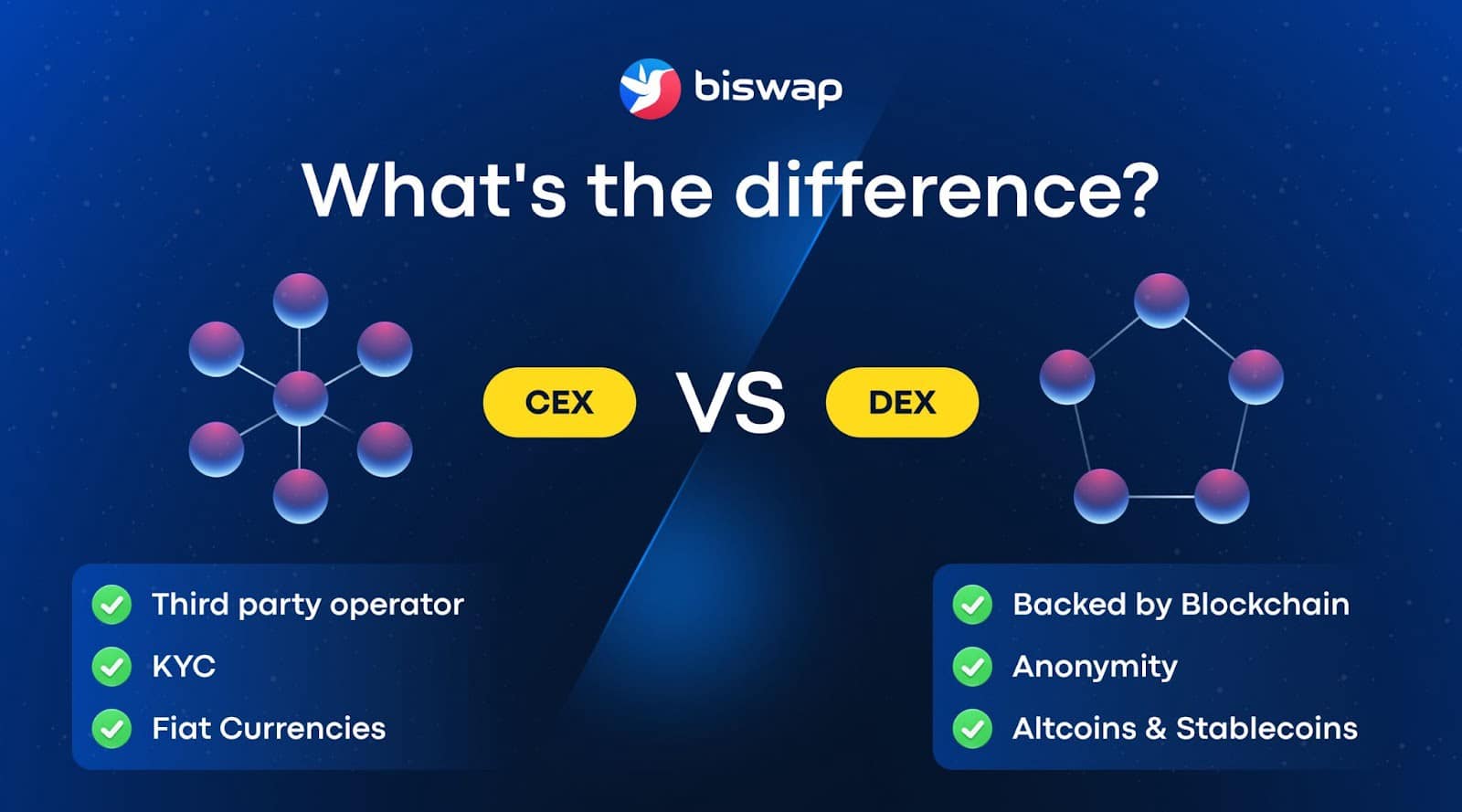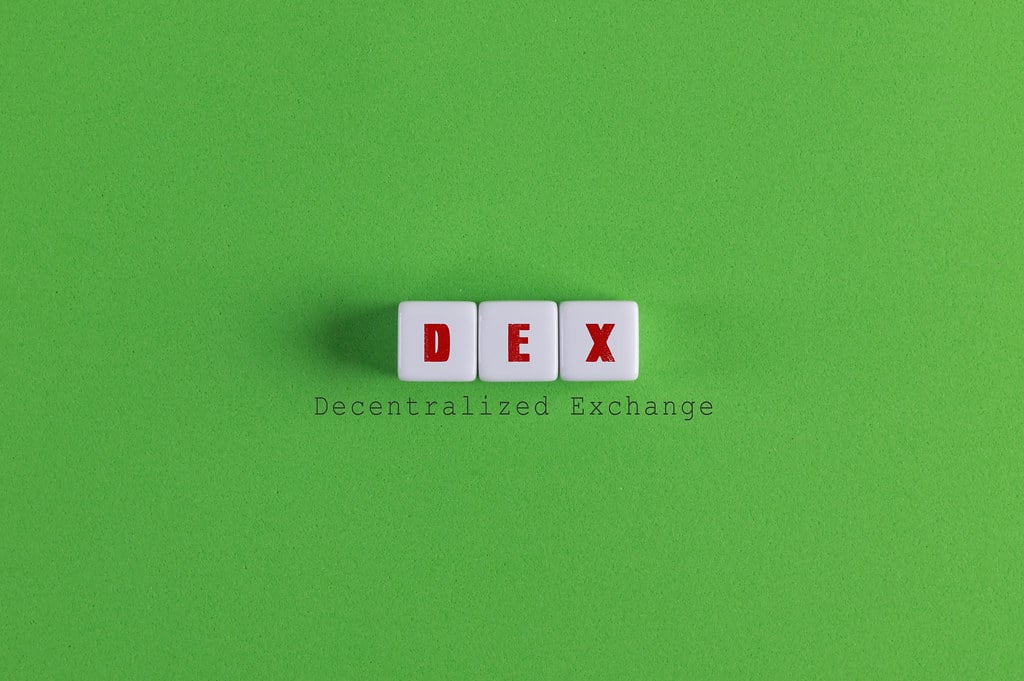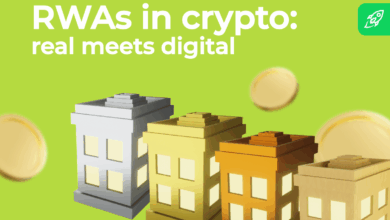What is a DEX, and how do decentralized exchanges work?

beginner
Blockchain use scenarios keep emerging worldwide, and understanding the underlying technologies is the crucial part of navigating the cryptocurrency market. As of lately, it’s becoming increasingly more important to understand what a decentralized exchange (DEX) is and how they work in the crypto sphere. DEXs provide users with an invaluable service: the ability to independently trade cryptocurrencies without relying on either centralized exchanges or third-party brokers. In comparison to conventional exchanges such as Coinbase and Binance, DEXs offer increased security, privacy, and anonymity that appeals to many types of investors.
If you’ve been considering using a DEX for trading cryptocurrencies but don’t know where to start, this blog post will explain everything you need to know about decentralized exchanges!
What Is Crypto Exchange?
A crypto exchange is a platform for buying and selling digital currencies like Bitcoin, Ethereum, and many others. A crypto exchange works similarly to a traditional stock exchange or foreign currency exchange.
There are two main types of exchanges, centralized exchanges and decentralized exchanges. Let’s examine these two closer.
What Is a Centralized Exchange?
The classic approach to cryptocurrency exchanges comes from centralized exchanges (CEXs). These exchanges serve as intermediaries, keeping users’ funds safe and carrying out trades for them.
When using a CEX, customers generally have to complete Know Your Customer (KYC) and Anti-Money Laundering (AML) checks which can take a while and require personal information.
What Is a DEX (Decentralized Exchange)?
As opposed to the traditional approach, DEXs offer users a way to exchange and trade cryptocurrencies without needing the involvement of a third-party intermediary. DEXs eliminate the need for a third-party to hold user funds or facilitate trading by utilizing smart contracts on blockchain networks. Smart contracts are computer protocols that execute themselves when predetermined conditions are met, and are used to facilitate financial transactions on decentralized exchanges (DEXs) over a blockchain network.
DEXs are typically less regulated than centralized exchanges and offer features such as atomic swaps and trustless transactions.
Types of Decentralized Exchanges
Decentralized exchanges are an important part of the cryptocurrency trading world. There are several types of decentralized exchanges, each of which works differently depending on the organization, how it was developed and other factors.
Order Book DEXs
Order book-based decentralized exchanges work similarly to those utilized in traditional exchanges for pairing up buyers and sellers. There are two kinds of DEXs that employ an order book: on-chain and off-chain.
On-chain order book
On-chain order books verify transactions and record this data on the blockchain via a network of nodes and crypto miners. Such order books are identical to those found in centralized crypto exchanges, with the exception that transactions are not confirmed by a third party. These order books are thought to be more transparent than off-chain order books because they are available for everyone to see on the blockchain.
On-chain DEXs require high throughput and low execution cost, so building one is only possible in networks with high bandwidth and low commissions. That explains why there is no on-chain orderbook DEXs on Ethereum.
The most popular DEXs that fall under this category are Serum and Tonic DEX, which run on Solana and NEAR blockchain protocols, respectively.
Off-chain order book
Off-chain DEXs use a third-party server for matching compatible orders and maintaining a record of trades. Off-chain order books often offer lower fees than on-chain order book DEXs, but they don’t, however, have the same degree of decentralization as rival DEXs.
dYdX and 0x are two of the most popular off-chain order book DEXs.
Automated Market Makers (AMMs)
Automated market makers (AMMs) are revolutionizing the world of decentralized exchanges (DEXs). By eliminating the need for an order book, AMMs allow anyone in the world to instantly access liquidity in a secure and permission-less way. This type of DEX uses tokens stored in a liquidity pool and a smart contract technology to calculate prices between assets based on their proportions, making swaps readily accessible at any time. In short, automated market makers are transforming the cryptocurrency landscape with an easy-to-use money robot that always has pricing available for token holders.
This type of protocol has become immensely popular since Uniswap’s launch in 2018 and has even spawned many copycat projects. Among these AMMs are Curve, SushiSwap, PancakeSwap and AirSwap (peer-to-peer marketplace), all offering features similar to what Uniswap does best: low fees, permissionless trading, and protection from counterparty risk.
DEX Aggregators
The third most widely spread category – DEX aggregators – are platforms that allow users to access multiple DEX s from a single interface. This makes it easier for users to compare prices and find the best deals.
Some DEXs (e.g Changelly DeFi Swap, 0x and KyberNetwork) actually combine these three approaches within one platform.
Despite differences in operational structure, all decentralized exchanges offer users with anonymity and privacy that may be lacking from more traditional exchanges. Let’s take a closer look at DEXs’ advantages list.
What Are the Benefits of Decentralized Exchanges?
There are several benefits to using decentralized exchanges, including reduced security risks, anonymity and privacy, reduced counterparty risks, and resistance to censorship.
A decentralized exchange (DEX) is a type of cryptocurrency exchange that operates without the need for a central authority or intermediary. This means that users are able to swap crypto assets directly with each other, without having to go through a third-party service such as an exchange or broker.
Decentralized exchanges are built on blockchain technology and use smart contracts to facilitate trades between users. This allows more secure transactions, as well as greater privacy and anonymity. Additionally, decentralized exchanges are often resistant to censorship, meaning that users can trade freely without fear of their trades being blocked or reversed.

Reduced security risks
DEXs offer increased security compared to centralized exchanges, as they do not hold user funds. Instead, users control their private keys and trade directly with other users.
Transparency
Transparency is an important aspect of decentralized exchanges. All trades are visible on the blockchain, which helps to ensure that all transactions are fair and secure, as well as providing users with greater peace of mind. Additionally, the use of smart contracts ensures that all trades are executed according to predetermined rules and conditions, further increasing transparency.
Custody
Since DEXs are non-custodial, traders don’t have to give up custody of their private keys in order to conduct transactions. Instead, DEXs engage with externally stored wallets, and trades via self-executive smart contracts.
Trustless Transactions
Trustless transactions are made possible by DEXs’ use of smart contracts to perform trades and record them to the blockchain. Furthermore, since DEXs do not deposit your assets, hackers are less likely to target them.
Token availability
DEXs offer access to a wider range of token listings compared to centralized exchanges, which are often selective about the tokens they list.
Anonymity & Privacy: no KYC/AML
Many DEXs do not require KYC/AML checks, allowing for anonymous and private trading.
Reduced Counterparty Risks
By removing the need for a trusted third party to hold user funds or execute trades, DEXs reduce counterparty risk.
Decentralization
Decentralization is a key feature of decentralized exchanges. By removing the need for a central authority or intermediary, DEXs allow users to trade directly with each other without having to go through a third-party service. This helps to ensure that all trades are secure and transparent, as well as providing users with greater privacy and anonymity. Additionally, decentralization makes it more difficult for malicious actors to manipulate the market or interfere with trades.
Resistance to Censorship
As DEXs do not rely on a central authority or intermediary, they are resistant to censorship and less likely to be impacted by changes in regulations.
DEX: Risks and Considerations
Increasingly, DEXs (decentralized exchanges) are becoming the go-to choice for those seeking to trade crypto funds without having to rely on a central authority. It is essential to comprehend the potential risks and concerns associated with DEXs before making use of them.
Smart Contracts Vulnerabilities
The possibility of smart contracts being vulnerable is one of the biggest risks associated with DEXs. If a smart contract isn’t written carefully, it could put user funds in danger of being stolen or going missing. Prior to using a DEX, it is essential for users to do their due diligence and become familiar with the security protocols in place.
Lack of Customer Support
Unlike centralized exchanges, DEXs do not typically have dedicated customer support teams. This means that if users run into any issues, they may not have access to someone who can help them resolve the issue. Additionally, because DEXs are run on decentralized platforms, users are solely responsible for the security of their private keys and funds.
As opposed to most DEX aggregators, Changelly DeFi Swap provides 24/7 support for its users. If any problems arise, customers can always ask for help at [email protected], and our support team will do everything to help you solve the problem as soon as possible.
Specific Knowledge Required
To use DEXs, one must possess a certain level of knowledge and understanding. As an example, users need to know how to securely keep their private keys and manage their cryptocurrency assets. Those unfamiliar with cryptocurrency or without the necessary technical experience may face difficulties using decentralized exchanges. Also, DEXs’ interfaces are typically less user-friendly than CEXs’ ones.
Uninspected Token Listings
One other potential risk with DEXs is the possibility of unchecked token listings. Many DEXs permit any token to be listed without inspection, whereas centralized crypto exchanges generally have strict listing requirements and conduct due diligence on new tokens. This may result in the presence of fraudulent or low-quality tokens, putting user funds at risk.
What Is Changelly DeFi Swap?
Changelly DeFi Swap is a DEX aggregator that allows users to swap tokens and coins in a decentralized manner. Our service gathers DeFi market liquidity from 100+ of the most popular DEXs. Changelly DeFi Swap also has its own market-maker that collects liquidity from various CEXs so users get the best of both worlds and can access the best prices for their trades.
Changelly DeFi Swap enables 3600+ token swaps on the Ethereum, Binance Smart Chain, Polygon, Fantom, Avalanche, and Optimism networks. As an aggregator, our platform always finds the best routes for your trades based on your requirements and guarantees to give you the best market rates.
So, are you ready to put your knowledge into practice? Click here to start!
Also read: How to Use Changelly DeFi Swap — a Step-by-Step Guide, Changelly DeFi Swap: Most Common Questions.
How to Use Decentralized Exchanges
As we mentioned above, decentralized exchanges can offer many benefits over traditional centralized exchanges. Here are some steps to help you get started using DEXs:
1. Choose a DEX: There are many different decentralized crypto exchanges available, so it’s important to do your research and find one that meets your needs. Consider factors such as transaction fees, security measures, and the types of assets supported.
Seasoned crypto users know that decentralized exchange (DEX) aggregators are the way to go. By choosing a DEX aggregator, users can purchase assets in a secure, efficient manner and make use of various liquidity pools from multiple exchanges – all at once.
2. Connect Your Wallet: Most DEXs require users to connect their wallets in order to trade. This is done by entering the wallet address into the exchange’s interface.
3. Start Trading: Once your wallet is connected, you can start trading on the DEX. Be sure to familiarize yourself with the platform’s features and trading tools before you begin.
4. Monitor Your Funds: It’s important to keep an eye on your funds and ensure that they are secure. Make sure to regularly check the DEX for any suspicious activity or unauthorized transactions.
How to Use Hardware Wallets with DEXs?
Hardware wallets are a secure way to store cryptocurrency and can be used with DEXs. To use a hardware wallet with a DEX, users must first connect their wallet to the exchange directly or via ConnectWallet. It’s important to note that hardware wallets are only as secure as the user’s security practices. Therefore, users should always ensure that their wallets are properly secured and regularly monitored for any suspicious activity.
What Are the Most Popular DEXs?
It’s important to know which DEXs are the most reliable and widely used prior to utilizing any decentralized exchange. Numerous decentralized exchanges are available, such as Uniswap, Curve, and Balancer.
Meanwhile, there’s always an option to choose a DEX aggregator which gathers the best rates from various liquidity providers in a unified interface.
Evaluate the features and benefits of these and other DEXs to determine which one is suitable for your needs.
Wrapping Up: Decentralized Exchange Evolution
To wrap it up, decentralized exchanges are gaining popularity in the crypto and DeFi world. Cryptocurrency exchanges provide advantages such as no need for a central authority, and improved access to financial services compared to traditional centralized exchanges. It’s essential for users to be aware of potential risks and concerns when using DEXs and to thoroughly research their options before selecting a platform. As the crypto world grows, decentralized exchanges (DEXs) are expected to become more and more popular, playing an integral part in the market.
FAQ
As DEXs become increasingly popular, many crypto traders have been left with a variety of frequently asked questions regarding their use. Appropriate research can provide answers to common questions such as wallet compatibility, currency support, and which DEX is the best fit for specific needs. Here are the answers to some of the burning questions.

What are examples of DEXs?
Cryptocurrency exchanges on decentralized networks offer trading of digital assets without requiring a central intermediary. DEXs execute trades and record them to the blockchain, enabling trustless transactions. Examples of widely used DEXs are Uniswap, Balancer, Kyber Network, Curve, PancakeSwap, and more.
What is the difference between an exchange and a DEX?
Exchanges enable people to buy and sell assets, including cryptocurrencies, but they are free-standing platforms that must be monitored by third parties. DEX is the type of exchange which allows users to make transactions directly between two wallets while pooling liquidity from multiple sources. A DEX operates on a decentralized network, providing greater security and privacy than a centralized exchange when conducting financial transactions.
How do decentralized exchanges make money?
Decentralized exchanges make a profit via trading fees and their native tokens if they have any.
Is it safe to buy crypto on decentralized exchange?
Yes! Actually, decentralized exchanges (DEXs) provide improved security compared to their centralized counterparts. You should thoroughly investigate and comprehend the DEX you’re using and store your cryptocurrencies in a protected crypto wallet.
Why is a DEX better than a CEX?
Using a decentralized exchange has many benefits compared to a centralized one. Decentralized exchanges (DEXs) provide more privacy and security as they do not store assets. What’s more, decentralized exchanges provide access to a broader range of digital assets as they enable trading of new tokens. The DEX is becoming increasingly popular in the crypto world due to its rising popularity, which appeals to both crypto traders and investors.
Disclaimer: Please note that the contents of this article are not financial or investing advice. The information provided in this article is the author’s opinion only and should not be considered as offering trading or investing recommendations. We do not make any warranties about the completeness, reliability and accuracy of this information. The cryptocurrency market suffers from high volatility and occasional arbitrary movements. Any investor, trader, or regular crypto users should research multiple viewpoints and be familiar with all local regulations before committing to an investment.





